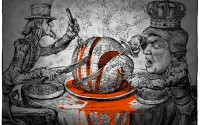Picture a situation in which most of the media, despite the overwhelming weight of medical opinion, refused to accept that there was a connection between smoking and lung cancer. Imagine that every time new evidence emerged, they asked someone with no medical qualifications to write a piece dismissing the evidence and claiming that there was no consensus on the issue.
Imagine that the BBC, in the interests of "debate", wheeled out one of the tiny number of scientists who says that smoking and cancer aren't linked, or that giving up isn't worth the trouble, every time the issue of cancer was raised.
Imagine that, as a result, next to nothing was done about the problem, to the delight of the tobacco industry and the detriment of millions of smokers. We would surely describe the newspapers and the BBC as grossly irresponsible.
Now stop imagining it, and take a look at what's happening. The issue is not smoking, but climate change. The scientific consensus is just as robust, the misreporting just as widespread, the consequences even graver.
If it is true, as the government's new report suggested last week, that it is now too late to prevent hundreds of thousands of British people from being flooded out of their homes, then the journalists who have consistently and deliberately downplayed the threat carry much of the responsibility for the problem. It is time we stopped treating them as bystanders. It is time we started holding them to account.
"The scientific community has reached a consensus," the government's chief scientific adviser, Professor David King, told the House of Lords last month. "I do not believe that amongst the scientists there is a discussion as to whether global warming is due to anthropogenic effects.
It is man-made and it is essentially [caused by] fossil fuel burning, increased methane production... and so on." Sir David chose his words carefully. There is a discussion about whether global warming is due to anthropogenic (man-made) effects. But it is not - or is only seldom - taking place among scientists. It is taking place in the media, and it seems to consist of a competition to establish the outer reaches of imbecility.
During the heatwave last year, the Spectator made the case that because there was widespread concern in the 1970s about the possibility of a new ice age, we can safely dismiss concerns about global warming today.
This is rather like saying that because Jean-Baptiste Lamarck's hypothesis on evolution once commanded scientific support and was later shown to be incorrect, then Charles Darwin's must also be wrong.
Science differs from the leader writers of the Spectator in that it learns from its mistakes. A hypothesis is advanced and tested. If the evidence suggests it is wrong, it is discarded. If the evidence appears to support it, it is refined and subjected to further testing. That some climatologists predicted an ice age in the 1970s, and that the idea was dropped when others found that their predictions were flawed, is a cause for confidence in climatology.
But the Spectator looks like the Journal of Atmospheric Physics compared to the Mail on Sunday and its Nobel laureate-in-waiting, Peter Hitchens. "The greenhouse effect probably doesn't exist," he wrote in 2001. "There is as yet no evidence for it." Perhaps Hitchens would care to explain why our climate differs from that of Mars.
That some of the heat from the sun is trapped in the Earth's atmosphere by gases (the greenhouse effect) has been established since the mid-19th century. But, like most of these nincompoops, Hitchens claims to be defending science from its opponents. "The only reason these facts are so little known", he tells us, is (apart from the reason that he has just made them up), "that a self-righteous love of 'the environment' has now replaced religion as the new orthodoxy".
Hitchens, in turn, is an Einstein beside that famous climate scientist Melanie Phillips. Writing in the Daily Mail in January, she dismissed the entire canon of climatology as "a global fraud" perpetrated by the "leftwing, anti-American, anti-west ideology which goes hand in hand with anti-globalisation and the belief that everything done by the industrialised world is wicked".
This belief must be shared by the Pentagon, whose recent report pictures climate change as the foremost threat to global security. In an earlier article, she claimed that "most independent climate specialists, far from supporting [global warming], are deeply sceptical". She managed to name only one, however, and he receives his funding from the fossil fuel industry.
Having blasted the world's climatologists for "scientific illiteracy", she then trumpeted her own. The latest report by the Intergovernmental Panel on Climate Change (which collates the findings of climatologists) is, she complained, "studded with weasel words" such as "very likely" and "best estimate". These weasel words are, of course, what make it a scientific report, rather than a column by Melanie Phillips.
If ever you meet one of these people, I suggest you ask them the following questions: 1. Does the atmosphere contain carbon dioxide? 2. Does atmospheric carbon dioxide influence global temperatures? 3. Will that influence be enhanced by the addition of more carbon dioxide? 4. Have human activities led to a net emission of carbon dioxide? It would be interesting to discover at which point they answer no - at which point, in other words, they choose to part company with basic physics.
But these dolts are rather less danger ous than the BBC, and its insistence on "balancing" its coverage of climate change. It appears to be incapable of running an item on the subject without inviting a sceptic to comment on it.
Usually this is either someone from a corporate-funded thinktank (who is, of course, never introduced as such) or the professional anti-environmentalist Philip Stott. Professor Stott is a retired biogeographer. Like almost all the prominent sceptics he has never published a peer-reviewed paper on climate change. But he has made himself available to dismiss climatologists' peer-reviewed work as the "lies" of ecofundamentalists.
This wouldn't be so objectionable if the BBC made it clear that these people are not climatologists, and the overwhelming majority of qualified scientific opinion is against them. Instead, it leaves us with the impression that professional opinion is split down the middle. It's a bit like continually bringing people on to the programme to suggest that there is no link between HIV and Aids.
What makes all this so dangerous is that it plays into the hands of corporate lobbyists. A recently leaked memo written by Frank Luntz, the US Republican and corporate strategist, warned that "The environment is probably the single issue on which Republicans in general - and President Bush in particular - are most vulnerable... Should the public come to believe that the scientific issues are settled, their views about global warming will change accordingly. Therefore, you need... to make the lack of scientific certainty a primary issue."
We can expect Professors Hitchens and Phillips to do what they're told. But isn't it time that the BBC stopped behaving like the public relations arm of the fossil fuel lobby?






